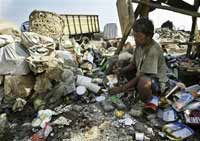With nothing else to wear, Indonesians wear trash
Used detergent labels and toothpaste tubes from Indonesia are going from landfills to fashion frills on bags and wallets sold in Singapore, Australia and the United States.

The fad known as "trashion" has gained mainstream acceptance with chic, urban designers worldwide now posting big profits by using leftover, discarded and found materials to create jewelry, clothing and housewares.
But in Indonesia, where half the population of 235 million live on less than US$2 a day, homemakers, disabled workers and local entrepreneurs are the ones embracing the eco-friendly fashion. The goal, they say, is to reduce pollution while providing jobs to the poorest of the poor.
Aswin Aditya, founder of the Jakarta-based company Plastic Works, buys plastic packaging from trash scavengers for US$0.30 a pound (US$0.66 a kilogram). His nine employees cut, sew and craft it into wallets, umbrellas and shower curtains that sell for between US$25 and US$85.
One of the destinations is Monsoon Vermont, an Internet-based eco-shop in the United States, which receives around 1,000 products a month, he said.
Recycling facilities are virtually nonexistent across most of Indonesia, where landfills are spilling over and where uncollected rubbish is often burned or ends up clogging streets and waterways. For some, the trashion industry is seen as a tiny but viable solution to unmanaged, growing consumer waste.
"What we do is small, but every little bit helps," said Aditya, who trains homemakers to produce goods suitable for export.
Indonesian designers, meanwhile, are showing their support for eco-fashion on the catwalk.
Computer-chip dresses and frocks made from plastic wrap wowed audiences in March, when models strutted their stuff during Eco Chic, an Asia-wide fashion show launched in Jakarta to help transform trash into haute couture.
Ann Wizer, director of the nonprofit venture XS Project, says one of the goals is to reach wider audiences.
"The hardest market in the world to access is developing countries. They don't want their trash, they want Chanel," said the former designer, who created XS as an artistic "intervention" to reduce waste production.
Though prominent designers and corporations also are adopting earth-friendly missions as the potential for profits increases, Wizer says for her, it "isn't about making money, it's about positive change."
Subscribe to Pravda.Ru Telegram channel, Facebook, RSS!


